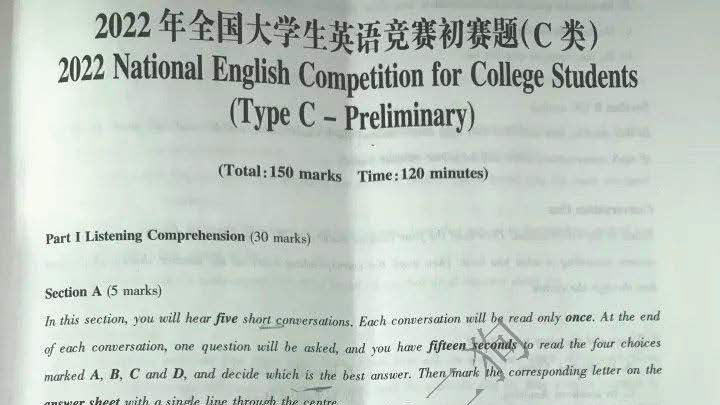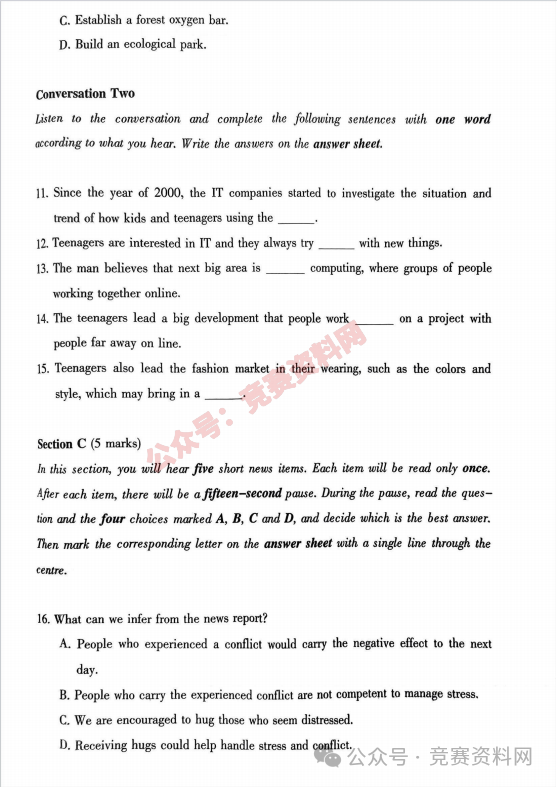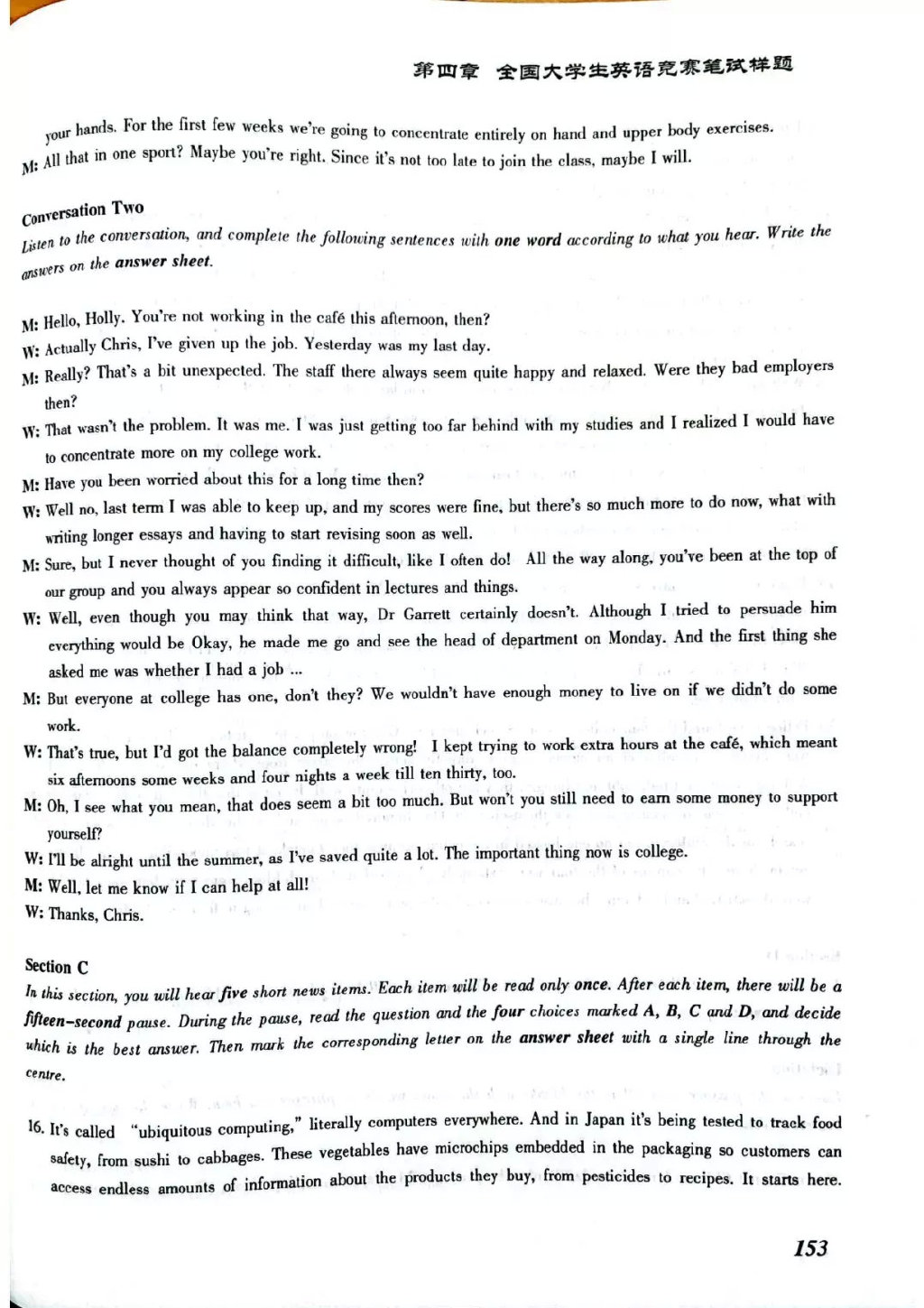2022全国大学生英语竞赛 完形填空 专项训练(ABCD类通用)
专项训练(一)
Read the following passage and fill in each blank with one word. Choose the correct word in one of the following three ways: according to the context, by using the correct form of the given word, or by using the given letter(s) of the word. Remember to write the answers on the answer sheet.
Bothered by those interrupting phone rings at cinemas? France might be the right place for you. The French Government just legalized the use of mobile phone blocking devices in cinemas, theatres and concert halls. It wanted to prevent audiences from being (1) dis by ring tones and telephone conversations.
The technology means that people can be prevented from receiving and (2) mobile telephone calls within 30 metres of the device. (3) emergency calls will be able to override the block.
French filmmakers have said that mobile phones in cinemas were havinga “disastrous” (4) im on ticket sales. The change in the law is part of the government’s campaign to make cinemas more attractive.
French industry minister Patrick Devedjian said, “It’s the same for concerts. You know how it is when (5) aw people let their phones ring during a concert.” The move was first debated in 2001. However, there was uncertainty over whether blocking devices could (6) telephone signals in cinemas and theatres without (7) (affect) signals on surrounding streets.
Before it was (8) (legal), the use of blocking devices was punishable with a (9) f of 20,660 pounds or a six-month prison sentence. Previously, France’s telecoms regulation authority tried (10) (encourage) concert audiences to use the vibrate mode or to switch off their phones entirely. However, it met with no apparent success.

专项训练(二)
Read the following passage and fill in each blank with one word. Choose the correct word in one of the following three ways: according to the context, by using the correct form of the given word, or by using the given letter(s) of the word. Remember to write the answers on the answer sheet.
Most Americans believe there are unspoken rules about mobile phone etiquette, according to an online poll. Checking emails, (1) text messages and making telephone calls while in the company of others are definite breeches (目中无人) of mobile manners. Texting during a date is also strictly forbidden. However, most people (2) (question) in an online poll said they would not be offended if they (3) re an electronic thank you, instead of a written note, and 75 percent had no objections to anyone using laptops, netbooks and mobile phones in the bathroom.
Sixty-two percent of the 2,625 adults (4) took part in the survey agreed that cell phones, laptops, netbooks and other electronic (5) de are part of daily life. Fifty-five percent also thought the demands of business mean people must stay connected, even (6) it involves taking a laptop ona holiday or answeringa cell phone during a meal. But despite the need to be constantly connected and the general acceptance of the technology, people were more (7) (sense) about technology abuses during holiday and religious activities.
Nearly 90 percent of Americans think cell phone use is (8) (accept) during a religious service, and 30 percent admitted they would be offended if they received an online gift wish.

But more than half revealed that they intended to send an electronic greeting card, (9) in of a traditional one. Etiquette is first and foremost a question of awareness. The social (10) r of when and how it is appropriate to use the technology are still being formed.
专项训练(三)
Read the following passage and fill in each blank with one word. Choose the correct word in one of the following three ways: according to the context, by using the correct form of the given word, or by using the given letter(s) of the word. Remember to write the answers on the answer sheet.
The new school year has begun in America, but some children do not go to school. (1) In , they learn at home, usually with their parents (2) teachers. Educational companies, libraries, school systems and the Internet provide families with (3) (teach) material.
Homeschooling is (4) (increase) popular. Homeschooling groups estimate that two-million children, around three percent, learn at home. The last government estimate was 1.3-1.7 million in 2007. Current (5)n are not expected until next year.
Some parents choose homeschooling because of their religious beliefs. Others say it (6) pro more time for the family to be together. Many parents also believe homeschooling avoids problems of a lot of traditional schools. One problem is classes with too many students. Critics, though, say children need to (7) at school with other children to help them learn things like social skills. They also say that some homeschooled children do not get a very good education. All fifty states and the District of Columbia permit homeschooling. Some, however, require more (8) (prepare) by parents or testing of children than others do.

There is even a National Home School Honour Society. Membership is based in part on the same tests (9) students take in school. Homeschooled children go to college and have also won top (10) (compete). These include this year’s National Geographic Bee. Fourteen -year -old James Williams knew that the Indian state of Goa is a former colony of Portugal.
专项训练(四)
Read the following passage and fill in each blank with one word. Choose the correct word in one of the following three ways: according to the context, by using the correct form of the given word, or by using the given letter(s) of the word. Remember to write the answers on the answer sheet.
There is a popular belief among parents that schools are no longer interested in spelling. No school I have taught in has ever ignored spelling or considered it (1) un as a basic skill. There are, however, vastly different ideas about (2) to teach it, or how much priority it must be given over general language development and writing (3) a . The problem is, how to encourage a child to express himself freely and clearly in writing without holding him back with the complexities of spelling? If spelling become the only focal point of his teacher’s interest, clearly a bright child will be likely to“play safe”. He will tend to write only words within his spelling range, (4) (choose) to avoid difficult language. That’s (5) teachers often encourage the early use of dictionaries and pay (6) a to content rather than technical ability. I was once shocked to read on the bottom of a sensitive piece of writing about a personal experience, “This work is terrible! There are far too many spelling (7) er and your writing is illegible.”It may have been a sharp criticism (8) the pupil’s technical abilities in writing, but it was also a sad reflection on the teacher who had omitted to read the essay, which contained some beautiful (9) (express) of the child’s deep feelings. The teacher was not wrong to draw attention to the errors, but if his priorities had centred on the child’s ideas, an expression of his disappointment with the presentation would have given the pupil more motivation to seek (10) (improve).
觉得文章有用就打赏一下文章作者
支付宝扫一扫打赏

微信扫一扫打赏


还没有评论,来说两句吧...